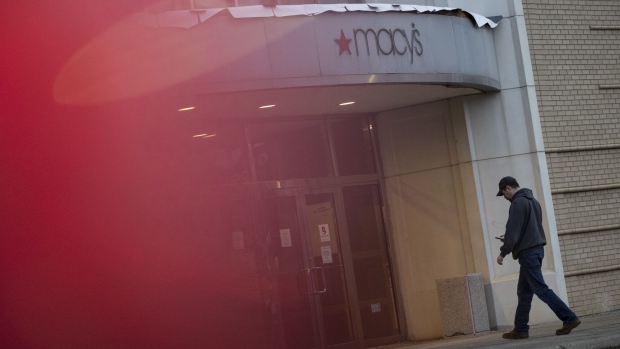Jun 1, 2023
Macy’s Falls After Cutting Outlook as Demand Trends Worsen
, Bloomberg News

(Bloomberg) -- Macy’s Inc. said earnings will be weaker than previously expected for the full-year, underscoring the uncertainty around US consumer spending through the remainder of 2023.
The department-store retailer said it would take markdowns and other measures to address excess spring merchandise in order to meet current consumer demand. It lowered sales guidance to “reflect anticipated macroeconomic impacts to the consumer,” the company said.
“We planned the year assuming that the economic health of the consumer would be challenged, but starting in late March, demand trends weakened further in our discretionary categories,” Chief Executive Officer Jeff Gennette said in a statement.
The shares were down 3.1% as of 9:56 a.m. in New York.
Read More: Investors Cheer Apparel Profit Improvements Despite Sales Slump
Same-store sales at the Macy’s namesake brand sank 8.7% on an owned basis, while the higher-end Bloomingdale’s dropped 3.9% and Bluemercury rose 4.3%. Gennette said on a call with analysts that roughly 50% of Macy’s brand customers make less than $75,000 per year, which is why the decline in sales at those stores was the most prominent.
The company also noted that credit card revenue was challenged by higher bad debt within the portfolio, a further sign of consumer weakness.
Bright spots in the quarter were beauty, fragrance and office clothing, and there’s limited price resistance in luxury “even in the current environment,” said Tony Spring, Macy’s president. Spring will replace Gennette after his retirement next year. That said, the aspirational consumer — shoppers in lower income brackets that had been splurging on luxury items — has retreated, Gennette said in an interview.
Adjusted earnings per share were 56 cents, compared with the average analyst estimate of 46 cents. Gross margin of 40%, meanwhile, met forecasts due to leaner inventory levels, the company said.
Macy’s results come after reports from mass-market apparel retailers last week, which impressed investors with better-than-expected profitability despite declining sales. Michael Kors-owner Capri Holdings Ltd., which generates a third of its revenue from department stores, said on Wednesday that full-year revenue will be weaker than previously forecast and pointed to “near-term uncertainties in the Americas.”
(Updates with details from call with CEO. A previous version corrected comparable sales in the fifth paragraph.)
©2023 Bloomberg L.P.






